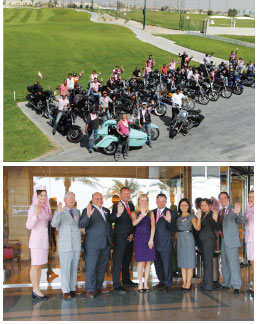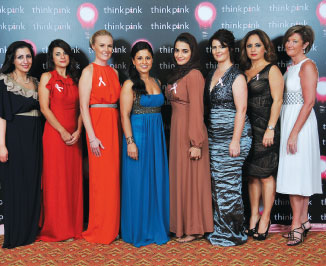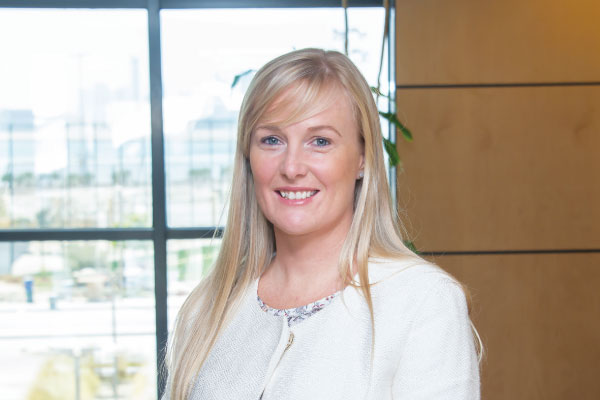The most common cancer among women worldwide, breast cancer is a leading cause of death globally. Armed with local support, Think Pink Bahrain has cracked the decades of silence that shrouded this silent disease.
For an ailment for which cause and cure continues to baffle scientists, breast cancer is best fought with early intervention, screening and awareness. However, in Bahrain and elsewhere in the region, a culture of taboos and myths surrounding this disease has significantly impacted the spread of knowledge.
Having been touched by breast cancer herself, Julie Sprakel set up Think Pink Bahrain in 2004 in order to make information about it accessible on the island. This was long before the proliferation of social media channels. Ten years later, the team’s success is a testament not only to their professionalism and commitment, but also to the support from the local community. We caught up with the founder and chairwoman of the organisation as she plans the celebrations of its milestone.
Woman This Month (WTM): Congratulations on completing a decade in Bahrain. What are your thoughts on this occasion?
Julie Sprakel (JS): I am extremely proud of this milestone. Our team here is driven by the support we receive from the public each year, which propels our mission further. We have enabled educational development at a healthcare level to support breast cancer patients in Bahrain.
I’ve been privileged to know remarkably strong women and their families, and to be part of their lives at an incredibly sensitive time. I’m most proud that we are a home-grown registered charity that now has a solid foundation and is one that a new generation can take forward.
 WTM: Looking back over the past years, what accomplishments stand out for you?
WTM: Looking back over the past years, what accomplishments stand out for you?
JS: We’ve funded nine healthcare professionals with an international certification from Klose Institute, Germany, to provide lymph oedema treatment. These nurses and physiotherapists work at Salmaniya Medical Complex, BDF Hospital and King Hamad University Hospital.
We’ve also paid tuition for four nurses to receive their MSc at RCSI Bahrain, with a thesis on breast cancer issues. The biggest achievement is the acceptance of a digital MRI machine by the Ministry of Health. Costing BD490,000, this machine will be operational by February 2015.
WTM: What events have you planned for the tenth anniversary?
JS: We’re holding the 9th Annual Ladies and Gents Golfing Event at the Royal Golf Club on October 16. This event has the largest number of female golfers participating on the island. We are hosting our anniversary celebration on October 17 with a gala evening event at The Ritz-Carlton Bahrain Hotel and Spa. This fundraiser will enable the charity to provide services to the community. Harley-Davidson’s Owners Group — Bahrain has confirmed their support for the annual Pink Awareness Ride in October, along with a Pink Rooftop Party earlier in the month.
WTM: Your campaign for 2014 seeks to involve men in building awareness. What is the rationale behind this strategy?
JS: A man with a partner, wife or mother can play a big part in the fight against breast cancer. We want to encourage men to join the women in their lives in the battle against cancer. Our core communication is focused on asking men to join hands with loved ones to encourage women to undergo monthly check-ups and self-examination.
We ask men to support the women in their lives with gentle encouragement about self-checking, because ultimately, early prevention is the key to saving lives. If women feel encouraged, they’ll do what’s best for their health.
 WTM: The opinion in the medical community is divided over mammography screening. How do women decide on whether they should go for this test?
WTM: The opinion in the medical community is divided over mammography screening. How do women decide on whether they should go for this test?
JS: Women need to be proactive about their health. Taking eight minutes each month to perform breast self-examinations is the first line of defence. If they know their bodies, they’ll be able to notice changes in them.
Mammography guidelines differ with countries. In Bahrain, it’s recommended for women over 40. The Ministry of Health offers free screening for nationals and expatriates at three health centres in the Kingdom.
WTM: How widely have you managed to reach the local community in Bahrain?
JS: We do a lot of lectures on breast self-examination within the community and many of our sponsors are local business personnel. Think Pink Bahrain is not an expatriate charity; over half of our volunteers are Bahraini. Our 2013-2014 campaign is centred on an Arab discourse.
There is a perception within the Arab population that breast cancer is a Western disease. Although considered a sensitive issue, communities should be aware that survival is more favourable when diagnosed earlier and includes basic education for frontline healthcare staff. The campaign is being rolled out in English and Arabic.
WTM: Where do you see this initiative 10 years down the line?
JS: I believe the charity has started to grow with collaborative partnership from the community and will flourish further. Education and training should be addressed at a community level with governmental support. Instead of relying on facts and figures from the West, relevant data and statistics need to be generated from the local population. This will encourage further research and provide a cultural foundation.
Medical institutions should make an effort to endorse such awareness training within their curriculum as these future professionals are the first support line for many patients. Up-to-date information should be provided to all healthcare professionals and therefore be held as a standard of practice. Healthcare delivery in terms of supporting breast cancer patients needs to be better aligned and not fractional. A holistic approach, professionalism and communication are key areas of development in moving forward.
Visit www.thinkpinkbahrain.com


































